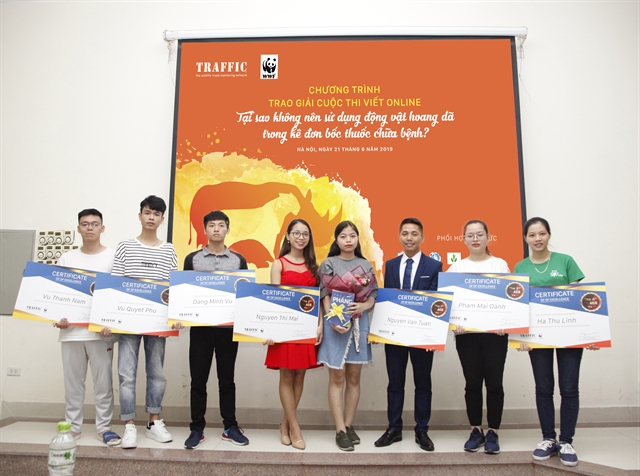 Environment
Environment

The winners of an essay writing competition on sustainable traditional medicine were announced at an awards ceremony held in Hà Nội on Saturday.

|
| The winners of an essay writing competition on sustainable traditional medicine were announced at an awards ceremony held in Hà Nội on Saturday. — Photo TRAFFIC |
HÀ NỘI — The winners of an essay writing competition on sustainable traditional medicine were announced at an awards ceremony held in Hà Nội on Saturday.
The competition, organised by the TRAFFIC wildlife trade monitoring network in partnership with WWF Germany, Behavior change communication agency Intelligentmedia and the Hà Nội Medical University (HMU) aimed to encourage ideas on sustainable, legal alternatives to illegal wildlife products in traditional medicine in Việt Nam.
Three entrants, Võ Thị Ánh Tuyết, Ngô Mai Thị Thanh Huyền and Nguyễn Văn Tuấn, beat 62 other university and college students to win first prizes for their essays.
The winning entries featured ideas on plant-based alternatives to rhino horn and other illegal wildlife products and reflected on the importance of protecting biodiversity—both for the future of the traditional medicine sector and the future of the planet. Finalists also noted the detrimental effect that poaching has on local communities and the necessity of abiding by the law.
“We aim to empower future traditional medicine practitioners to seek out legal, sustainably sourced products. This work contributes to efforts tackling the global threat posed by the illegal wildlife trade and provides ways for the traditional medicine community to proactively protect endangered species,” said TRAFFIC’s Việt Nam director Sarah Ferguson.
“We are glad to see students showing a growing interest in the conservation of the environment, biodiversity and wildlife species through this contest. It is of the utmost importance that we all raise their voices to eliminate the use of endangered wild species in traditional medicine,” said Đào Anh Sơn from HMU’s Training, Research and International Cooperation Department.
In 2018, also with funding from WWF Germany, TRAFFIC held a series of workshops for traditional medicine students, offering guidance on sustainable alternatives to illegal wildlife products. At the workshops, 85 per cent of students stated that they would not recommend illegal wildlife products, compared with an initial 68 per cent.
The majority of entrants were traditional medicine students, perhaps indicating a shift in attitude towards the acceptability of these products in a sector that still has links to the use of products from endangered species, such as rhino horn, pangolin scales, and tiger bones, despite their use being banned. So far this year, more than 40 tonnes of pangolin scales have been seized either in Việt Nam or en route to the country. — VNS




